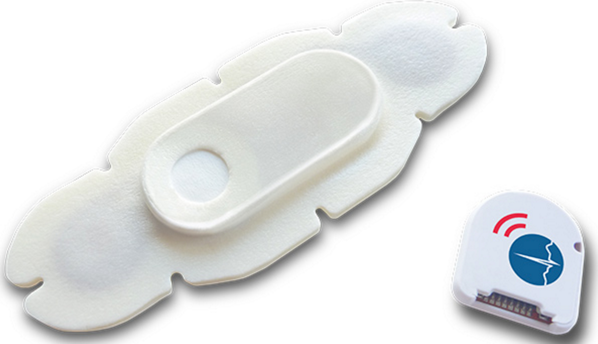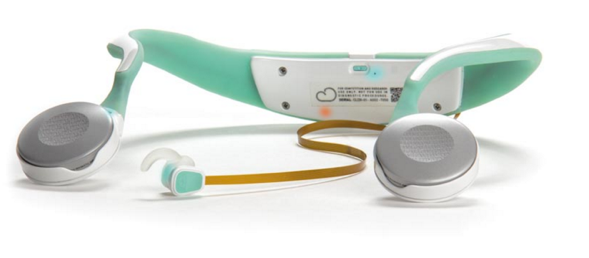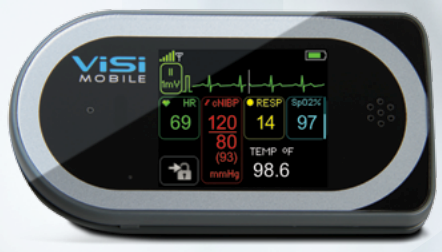When used in the context of medical devices, biosensors is a broad term that describes devices and instruments that measure a broad range of biochemical reactions in the body as indicators of specific physiological processes. Biosensors are used to measure parameters related to cardiac and respiratory health, body temperature, and physical activity. They are used in hospitals and hospices to monitor patients with existing chronic conditions. Many modern devices are also capable of diagnosing a number of cardiac, respiratory, and circulatory conditions. Wearable biosensors allow physicians to monitor patients in real-time, could facilitate the early diagnosis of potentially life-threatening conditions, reduce hospital admissions, and shorten the length of hospital stays.
HealthPatch MD by Vital Connect

HealthPatch MD is a biosensor that is comprised of two parts: a disposable adhesive patch and a reusable sensor module. It collects a number of biometric measurements and detects vital signs, including a single lead electrocardiogram, heart rate, inter-beat (RR) interval, heart rate variability, respiration rate, skin temperature, body posture, and activity such as steps. It is also capable of detecting falls. It is designed to improve patient care, reduce healthcare costs, and increase access, and can be used at home as well as in the outpatient and inpatient settings. HealthPatch MD is used primarily for managing chronic diseases or monitoring patients with dementia. It has obtained regulatory approval in the US, Canada, Europe, and Japan.
Vitaliti by Cloud DX
 Vitaliti is a monitor that is worn around the neck. It can continuously monitor a number of vital signs, including core body temperature, blood pressure, heart rate, electrocardiogram (ECG), respiration, oxygen saturation, posture, movement, and steps. These measurements are made using four sensors: a core thermometer, an electrocardiograph, a pulse oximeter (also known as a photoplethysmograph), and a three-axis accelerometer. The device collects data and then links to the cloud and a downloadable app, which can provide lifestyle advice to help you improve your health.
Vitaliti is a monitor that is worn around the neck. It can continuously monitor a number of vital signs, including core body temperature, blood pressure, heart rate, electrocardiogram (ECG), respiration, oxygen saturation, posture, movement, and steps. These measurements are made using four sensors: a core thermometer, an electrocardiograph, a pulse oximeter (also known as a photoplethysmograph), and a three-axis accelerometer. The device collects data and then links to the cloud and a downloadable app, which can provide lifestyle advice to help you improve your health.
Visi Mobile by Sotera Wireless
 The Visi Mobile system was devised for physicians to allow them to monitor at-risk patients continuously, remotely, and in real time. The device is worn around the wrist with an optional chest sensor and blood pressure cuff, and so it does not affect patient comfort or mobility. It can monitor skin temperature, continuous blood pressure (non-invasively), oxygen saturation, pulse, heart rate, electrocardiogram (ECG), and respiration rate. The recorded information can be transmitted directly to a computer and then transferred to a patient’s electronic medical records.
The Visi Mobile system was devised for physicians to allow them to monitor at-risk patients continuously, remotely, and in real time. The device is worn around the wrist with an optional chest sensor and blood pressure cuff, and so it does not affect patient comfort or mobility. It can monitor skin temperature, continuous blood pressure (non-invasively), oxygen saturation, pulse, heart rate, electrocardiogram (ECG), and respiration rate. The recorded information can be transmitted directly to a computer and then transferred to a patient’s electronic medical records.